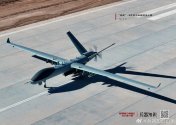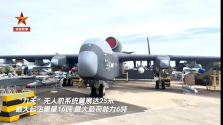Their regular range is 10000 km. I really don't think carrying 2t of payload would lower that be 70%. Doing bombing runs out to 1500km from the mainland border seem within their range.
For long endurance missions, they can certainly do that. But why not also also make it available for longer range missions?
I also don't know your argument for being more vunerable than H-6K. It should at minimum have much lower signature.
Considering we don't know what the range of the KD-21 actually is, I would hesitate to be so confident to say that they merely need to be 1500km outside of the PRC mainland coast/border.
As for survivability versus a H-6K, it is not merely about signature (which a CH-9 loaded with such huge weapons will have a significant signature anyway), but also speed. My view is that they're both not particularly survivable without substantial degradation of enemy air power and air defenses and naval power, as well as needing substantial fighter escort.
But sure, if we want to entertain the idea of CH-9s and H-6Ks carrying out strike missions with KD-21s against somewhere like Guam or like Australia, then chances are it's because you're desperate to maximize your salvo size and accepting you'll lose a bunch of aircraft on the way out, or that you've substantially secured air and sea control out to about 2000km at least, in which case the war is going your way anyhow and sending non-survivable aerial assets out at range is no big deal because you've done the hard work of fighting the initial phases of the conflict.
My view is to prefer avoiding scenarios where they are too desperate and have to throw everything and the kitchen sink in an opening salvo (which reflects their own incompetence), and to avoid scenarios where they've already mostly fought and succeeded through the hard part of the conflict (which would be presumptuous of their ability to win the hard part to begin with).
Instead, the most useful way to think of assets is how they could be utilized to contribute to the actual difficult part of a war where opfor assets have yet to be degraded and what threats are best matched to their characteristics.
That is why I view this kind of system like CH-9 as being more realistically for long endurance closer in ISR, EW and maybe ASW missions closer to China's coast, because in the opening phases of a high intensity environment there is a higher likelihood of that airspace being able to be more realistically secured by the PLA to enable their safe operation.






